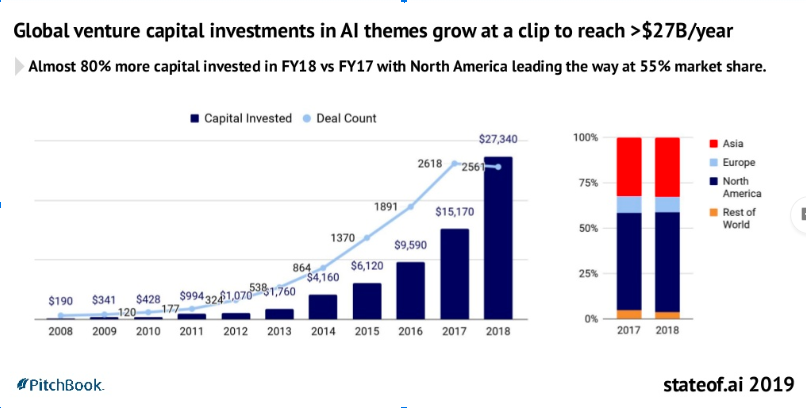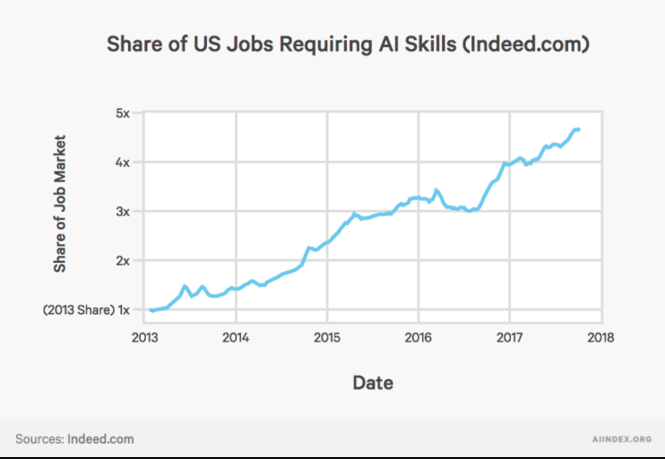Are We in an AI Bubble?

What is AI:
There is no doubt that we’re all getting a bit jaded from the hype around AI today, where anybody who reads a Wired magazine article thinks they’re a futurist. Many people get confused between the AI we use today and AGI (Artificial General Intelligence), which refers to a human level AI. In this blog post, I won’t be discussing AGI as it does nothing to advance the discussion of the usefulness of AI in today’s economy and it’s also not clear whether AGI will ever be achieved.
Today, AI is simply a machine (or perhaps better imagined as a tool) that has learned how to make a decision in a particular situation, such as identifying objects in a photo, fraud detection, or predicting what kind of movies we’re interested in. Nonetheless, these simple decision making tools have had a profound impact in the world. Like many other major breakthrough technologies, a lot of hype has built up around AI.
The AI Bubble?
Perhaps it’s just my scepticism, but when you look at the data it’s hard not to see repeating patterns from other bubble economies. The dot com era, 3D printing and even the cryptocurrency/blockchain all saw similar insane growth in the commodities in each industry. Over the last 10 years we’ve seen exponential growth in global investment in AI, with the total investment in 2018 being 80% higher than that of 2017.
(source: slideshare.net)
In the same period we have seen a 5x increase in jobs requiring AI Skills. The demand for AI skills in the workplace has seen many people turning to MOOCs or Bootcamps to adapt to the changing marketplace. Coursera’s Machine Learning Stanford course delivered by Andrew Ng, is one of the most popular MOOC today with almost 3 million people enrolled.
These trends aren’t limited to just industry. In academia we’ve seen a similar trend in the number of AI papers being submitted for publishing. In 2019 the AI conference NeurIPS received over 6,700 submissions. This is a 4x increase on the number of submissions in 2014.
Of course, there are really exciting developments happening in AI, like Tesla’s Autopilot and OpenAI’s GPT2 text generator. But there is also no shortage of companies making false claims about their AI powered products as click-bait marketing campaigns. In fact, 40% of AI companies in Europe alone have no AI technology within their product offering. I think it’s safe to say that at this stage we’re all getting a little nauseous from the bandwagoners harping on about their intelligent product solutions that will revolutionise the way we work and live.
Why AI won’t fade into the distance:
Despite this, AI is not something that is going to fade into a distant memory like your MySpace profile. The hype surrounding AI is more analogous to the dot com bubble. In the early 2000’s companies like Amazon, Google and Paypal emerged from the dot com crash and in the years that followed we saw Facebook and YouTube being established. Yes, there is a lot of noise around the area, but when we peel back the layers of marketing, there exists a technology that provides real value, and has been doing so for over two decades.
When it comes to business, AI has a remarkable tendency to solve really difficult problems. For instance, AI can spot buying patterns in consumer behaviour and help a business identify opportunities to upsell new products or services. Or an AI can predict when an existing customer is going to churn and suggest an intervention to help the business retain them. Amazon claims that 35% of the sales on their platform are driven by their recommendation system. In fact, it’s predicted that AI will lead to a growth in global economic output of 16%, or $13 trillion, by 2030.
These types of insights aren’t only good for businesses, other applications are seeing AI being used to fight climate change, help deliver aid to disaster areas and combat against deforestation. In the same manner as the internet has become a focal point of our day-to-day lives, I think we can assume the permanence of AI in society. If you know of some great application of AI, in your organisation or elsewhere, that you find is delivering real value, let me know at iain@skellig.ai, I would love to hear from you!
Author


